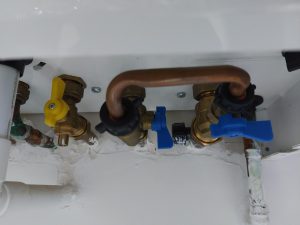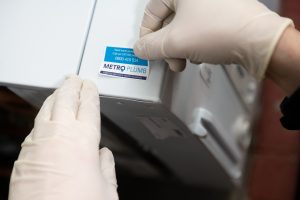How to Repressurise Your Boiler: A Complete Guide
- Home
- >
- Help & Advice Centre
- >
- How to Repressurise Your Boiler: A Complete Guide
If you’ve noticed that you don’t have any hot water or your radiators aren’t getting as hot as they should, the issue could be your boiler pressure. A drop in pressure can prevent your boiler from heating your home and providing hot water effectively.
The good news is that low boiler pressure is easy to identify, and in many cases, you can fix it yourself. So, if you’re experiencing problems with your boiler, like no heating or hot water, here’s our simple guide to re-pressurising your boiler.
Some signs your boiler or combi boiler pressure may be too high or low include:
To check your boiler pressure, look for the pressure gauge on your boiler. The gauge will indicate the current pressure in bars. A typical boiler should have a pressure between 1 and 1.5 bars when cold. If the pressure is too low (below 1 bar), you’ll need to top it up. If it’s too high (above 2.5 bars), you might need to release some pressure.
Yes, you can repressurise your boiler yourself, provided you follow the manufacturer’s instructions. If you’re unsure, refer to your boiler’s user manual or consult a professional.

A copper filling loop with blue handles.
First, locate the filling loop, which can vary in design. It is often a small silver hose beneath the boiler, but it could also be a copper pipe.
Next, open the valve slowly to allow water into the system until the pressure gauge reads between 1 and 1.5 bar. Once the pressure is at the correct level, close the valve and remove the filling loop.
Finally, check the pressure gauge to ensure it stays steady. If you’re unsure or the pressure drops again quickly, it may indicate an underlying issue, and you should contact a professional.
It’s important not to over-pressurise your boiler. If the pressure exceeds 2.5 bars, it could trigger the pressure relief valve and cause water to leak. Always check the pressure gauge and stop once it reaches the recommended level.
If your boiler doesn’t have a filling loop or internal filling key, you may need to contact a professional plumber. Some modern systems come with keyless solutions or require a manual top-up, so refer to your boiler manual for guidance.
There are several reasons why your boiler or combi boiler pressure may drop, including:

Regularly check the pressure: Take pressure readings every few months to ensure your boiler is running efficiently.
Repressurising your boiler is an essential skill for every homeowner. By following the steps outlined in this guide, you can easily top up your boiler pressure and keep your heating system working efficiently. If you’re ever unsure, don’t hesitate to contact a professional.
At Metro Plumb, our team of expert plumbers is available 24/7, 365 days a year, to assist with all your plumbing and boiler needs.
Find your local Metro Plumb by visiting our find a local plumber page or call us on 0808 250 9949.